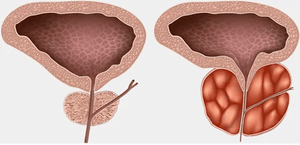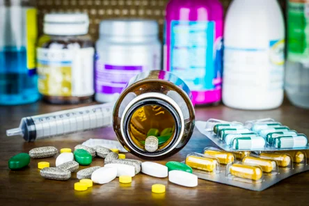
In the treatment of prostatitis, drug therapy is most often prescribed. During the course of its passage, the patient must take medications of several categories. Some are meant to eliminate the symptoms that cause discomfort, while others purposely act directly on the affected gland, eliminating the most important thing: the root cause. At the same time, drugs differ in the strength of the effect, as some are intended to eliminate acute, while others are against chronic. Let's take a look at the most popular drugs used in the treatment of inflammation of the prostate.
Types of medications for prostatitis
All medications prescribed by the treating physician can be roughly divided into several categories depending on the method of administration:
- Tablets and capsules- taken orally, moderately absorbed by the body, in the case of capsules, absorption occurs much faster, since all components reach the destinationafter a short period of time after the gelatinous coating dissolves.
- Injections: these can be both liquid and powder preparations, which are subsequently diluted in a working liquid, usually an anesthetic, administered intramuscularly or intravenously, and the effect can be noticed after a fewminutes. . . .
- Rectal suppositories (suppositories): They have anti-inflammatory, antibacterial and analgesic effects, they are administered to the patient in the rectum when they are on their side, and in this position it should take about half an hour for the drugdissolves completely. and absorbed.
- Instilations- a group of drugs that have the maximum positive effect only in case of direct admission to the area of the affected prostate gland, the method is used in a hospital setting, since the introduction isperformed through the urethra.
- Microclysters- as a rule, these include non-pharmacological medications, for example, herbal decoctions, they cannot replace drug therapy, but they can be a good remedy to relieve or prevent pain.

It should be noted that some types of drugs can be sold in several forms at once, for example, tablets and suppositories, so this feature should be indicated by the attending physician without fail.
The most popular drugs for the treatment of prostatitis
Treatment of prostatitis with drugs is a rather complicated procedure that requires the doctor to select the correct drugs that will not only relieve pain and eliminate other symptoms with manifestations, but also help to eliminate the root cause of the disease. The disease itself can also have a different origin, manifest itself in acute or chronic forms and produce a wide variety of inconveniences for the patient, limiting him both in natural matters and to cause complete infertility.
Classic tablets, intramuscular injections and suppositories for rectal administration can be used in the treatment of prostatitis. The choice of a drug depends directly on the need for the urgency of administration of its components to the affected organ.
Additional tools
Treatment of prostatitis is not limited to a list of several medications. Specialists may also use other types of drugs in different categories.
Fluoroquinolones
Fluoroquinolones are antibacterial drugs used in the treatment of the tuberculosis origin of prostatitis. These funds are used in a complex way, and the patient can be prescribed a course consisting of four or more drugs at once.
Cephalosporins
Cephalosporins are antimicrobial drugs that target specific types of bacteria.
Such drugs can have a wide and targeted spectrum of action, and the need to use this or that remedy depends directly on the form of the disease and the cause of its appearance.
Macrolides
Macrolides are rarely used in the treatment of prostatitis, as they are intended to fight certain types of bacteria, such as mycoplasma and chlamydia. By the way, such a disease as chlamydia is often accompanied by prostatitis, so doctors prescribe several tests at once to identify problems with the prostate gland in the early stages.
In case of acute manifestations of prostatitis, the attending physician may prescribe several drugs of different categories at the same time. This approach allows you to effectively address both the symptomatology and the disease itself.
Painkillers
The vast majority of analgesics are prescribed in the presence of acute pain syndrome, which is an integral companion of chronic prostatitis, but more frequently exacerbated. The use of drugs belonging to this group is not strictly recommended outside the framework of drug therapy aimed at eliminating the disease, since the body quickly gets used to them, and to achieve an analgesic effect, an increase in thedosage, which can adversely affect the liver and kidneys. The course of painkillers is prescribed individually.
Alpha blockers and muscle relaxants
The main task of these groups of drugs is to relieve the tension of the spasmodic muscles of the bladder, the urethral canal, and also to reduce the pressure in the pelvic region. These remedies help eliminate the feeling of discomfort and normalize the urination process.
Immunomodulators
Such preparations basically contain natural ingredients, in the case of prostatitis, extracts based on the tissues of the prostate gland of cattle. Regardless of the drug, they all have a common principle of action that allows:
- slow down the course of inflammatory processes;
- increases the tone of the smooth muscles and the walls of the bladder;
- to minimize the possibility of blood clots;
- improve blood circulation in the prostate gland;
- reduces the volume of the prostate.
Immunomodulators can be used for a number of diseases, including chronic prostatitis, acute non-infectious prostatitis, and prostate adenoma.
In addition, such funds are actively used for prophylactic purposes, helping to prevent the onset of the disease or its relapse.
Vitamins and dietary supplements
Media that fall into these categories can reduce inflammation, improve fluid drainage, and eliminate congestion. The need for such drugs is also due to insufficient intake of beneficial nutrients, especially during a course of antibiotics.
Prostatitis is a rather complex disease that should only be treated by a true specialist. Self-selection of drugs is not strictly recommended, since with this approach there is a large proportion of the probability of complications in the form of infertility, impotence and even increases the risk of developing cancer. The use of drugs for prostatitis without consulting a doctor can lead to the fact that it will be impossible to get rid of the disease without surgery. Furthermore, self-treatment is complicated by the impossibility of making an accurate diagnosis, since this requires the appropriate equipment and knowledge.
It should also be remembered that most of the drugs used in the treatment of prostatitis are quite toxic and some types are simply incompatible. If you feel pain in the pelvic area when urinating, defecating or ejaculating, go to the bathroom frequently and you cannot empty your bladder normally, do not risk it; Consult your doctor. Thus, not only will you avoid the unfavorable course of the disease, but you will also be able to avoid the development of its chronic form, with which you will have to live your whole life. In addition, your sexual function will not be affected and, with timely treatment, you will be able to have completely normal and healthy offspring.
























